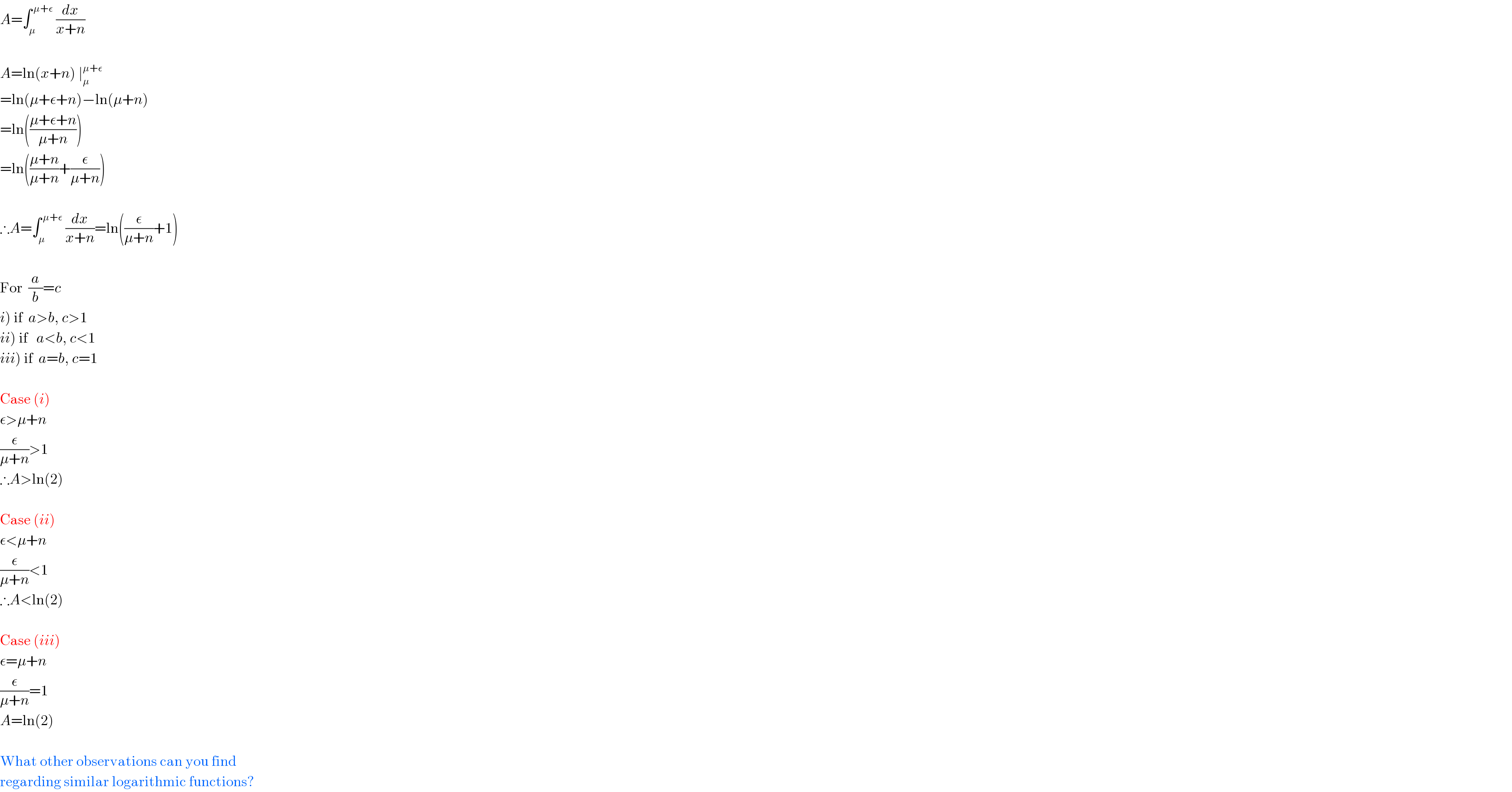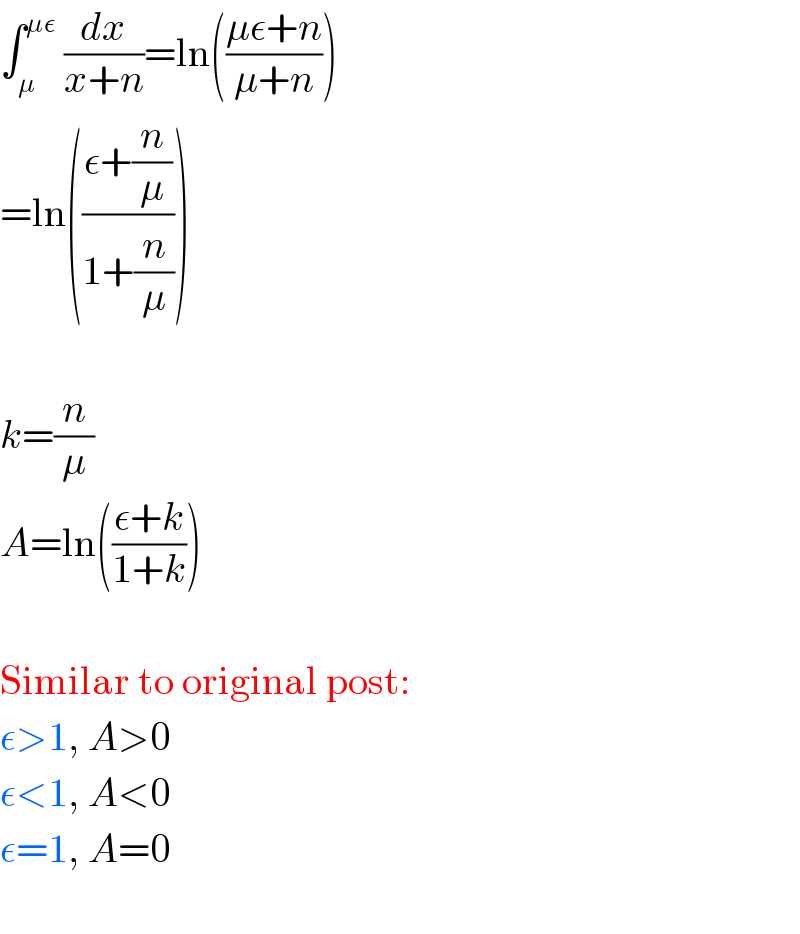
Question Number 3017 by Filup last updated on 03/Dec/15

$${A}=\int_{\mu} ^{\:\mu+\epsilon} \:\frac{{dx}}{{x}+{n}} \\ $$ $$ \\ $$ $${A}=\mathrm{ln}\left({x}+{n}\right)\:\mid_{\mu} ^{\mu+\epsilon} \\ $$ $$=\mathrm{ln}\left(\mu+\epsilon+{n}\right)−\mathrm{ln}\left(\mu+{n}\right) \\ $$ $$=\mathrm{ln}\left(\frac{\mu+\epsilon+{n}}{\mu+{n}}\right) \\ $$ $$=\mathrm{ln}\left(\frac{\mu+{n}}{\mu+{n}}+\frac{\epsilon}{\mu+{n}}\right) \\ $$ $$ \\ $$ $$\therefore{A}=\int_{\mu} ^{\:\mu+\epsilon} \:\frac{{dx}}{{x}+{n}}=\mathrm{ln}\left(\frac{\epsilon}{\mu+{n}}+\mathrm{1}\right) \\ $$ $$ \\ $$ $$\mathrm{For}\:\:\frac{{a}}{{b}}={c} \\ $$ $$\left.{i}\right)\:\mathrm{if}\:\:{a}>{b},\:{c}>\mathrm{1} \\ $$ $$\left.{ii}\right)\:\mathrm{if}\:\:\:{a}<{b},\:{c}<\mathrm{1} \\ $$ $$\left.{iii}\right)\:\mathrm{if}\:\:{a}={b},\:{c}=\mathrm{1} \\ $$ $$ \\ $$ $$\mathrm{Case}\:\left({i}\right) \\ $$ $$\epsilon>\mu+{n} \\ $$ $$\frac{\epsilon}{\mu+{n}}>\mathrm{1} \\ $$ $$\therefore{A}>\mathrm{ln}\left(\mathrm{2}\right) \\ $$ $$ \\ $$ $$\mathrm{Case}\:\left({ii}\right) \\ $$ $$\epsilon<\mu+{n} \\ $$ $$\frac{\epsilon}{\mu+{n}}<\mathrm{1} \\ $$ $$\therefore{A}<\mathrm{ln}\left(\mathrm{2}\right) \\ $$ $$ \\ $$ $$\mathrm{Case}\:\left({iii}\right) \\ $$ $$\epsilon=\mu+{n} \\ $$ $$\frac{\epsilon}{\mu+{n}}=\mathrm{1} \\ $$ $${A}=\mathrm{ln}\left(\mathrm{2}\right) \\ $$ $$ \\ $$ $$\mathrm{What}\:\mathrm{other}\:\mathrm{observations}\:\mathrm{can}\:\mathrm{you}\:\mathrm{find} \\ $$ $$\mathrm{regarding}\:\mathrm{similar}\:\mathrm{logarithmic}\:\mathrm{functions}? \\ $$
Commented byFilup last updated on 03/Dec/15

$$\mathrm{Maybe}\:\mathrm{look}\:\mathrm{at}\:\mathrm{cases}\:\mathrm{of}\:\int_{\mu} ^{\:\mu\epsilon} ,\:\int_{\mu} ^{\:\mu^{\epsilon} } ,\:{etc}. \\ $$
Commented by123456 last updated on 03/Dec/15

$$\mu>−{n}\vee\mu+\epsilon<−{n} \\ $$
Commented byFilup last updated on 03/Dec/15

$$\mathrm{Please}\:\mathrm{elaborate}? \\ $$
Answered by Filup last updated on 03/Dec/15

$$\int_{\mu} ^{\mu\epsilon} \:\frac{{dx}}{{x}+{n}}=\mathrm{ln}\left(\frac{\mu\epsilon+{n}}{\mu+{n}}\right) \\ $$ $$=\mathrm{ln}\left(\frac{\epsilon+\frac{{n}}{\mu}}{\mathrm{1}+\frac{{n}}{\mu}}\right) \\ $$ $$ \\ $$ $${k}=\frac{{n}}{\mu} \\ $$ $${A}=\mathrm{ln}\left(\frac{\epsilon+{k}}{\mathrm{1}+{k}}\right) \\ $$ $$ \\ $$ $$\mathrm{Similar}\:\mathrm{to}\:\mathrm{original}\:\mathrm{post}: \\ $$ $$\epsilon>\mathrm{1},\:{A}>\mathrm{0} \\ $$ $$\epsilon<\mathrm{1},\:{A}<\mathrm{0} \\ $$ $$\epsilon=\mathrm{1},\:{A}=\mathrm{0} \\ $$ $$ \\ $$
